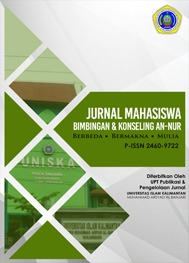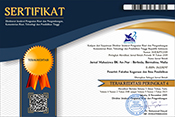KAJIAN EMPATI BUDAYA DALAM PERSPEKTIF FILSAFIAH DAN ILMIAH
(1) STKIP-PGRI Bandar Lampung
(2)
(3)
(*) Corresponding Author
Sari
Kata Kunci
Teks Lengkap:
PDFReferensi
Allport, G. W. (1961). Pattern and Growth in Personality (Holt (ed.)). Reinhart & Winston.
Aspinall, E. (2008). Ethnic and Religious Violence in Indonesia: Review Essay. Australian Journal of International Affairs. 62(4) hlm. 558-572.
Bhaskar, T. (2011). Assessing effectiveness of multicultural readings in ethnocultural empathy for undergraduate students. PhD Dissertation: University of Tennessee.
Blackmon, S.M. (2010). Digging below the demography level: examining the effects of internalized racial and social attitudes on white physicians-in-training self-reported cross cultural competency. Disertations, Loyola University Chicago.
Boddie, C. R. (2018). Factors related to ethnocultural empathy among white counselor education faculty: Implications for African American male students. Dissertation Abstracts International: Section B: The Sciences and Engineering, 79(10-B(E)).
Braskamp, L.A. (2009). Internationalization In Higher Education: Four Issues To Consider. Journal of College & Character. 10(6) hlm. 1-7.
Brouwer, M.A.R., & Boros, S. (2010). The Influence Of Intergroup Contact And Ethnocultural Empathy On Employees’ Attitudes Toward Diversity. Cognition, Brain, Behavior. 14(3) hlm 243-260.
Broome, B. J. (2017). Intercultural empathy. The International Encyclopedia of Intercultural Communication, 1-6.
Carkhuff, R. R. (1969). Helping and Human Relations. Human Resource Development Publisher.
Casmini, C. (2012). Menggagas Konseling Berwawasan Budaya Dalam Perspektif Budaya Indonesia. Hisbah: Jurnal Bimbingan Konseling dan Dakwah Islam, 9(1), 1-15.
Chao, R.C.L, dkk. (2015). White Racial Attitudes and White Empathy: The Moderation of Openness to Diversity. The Counseling Psychologist. 43(1) hal. 94-120.
Cordeiro-Rodrigues, L., & Simendic, M. (Eds.). (2016). Philosophies of multiculturalism: Beyond liberalism. Taylor & Francis.
Cornish, J. A., Schreier, B. A., Nadkarni, L. I., Metzger, L. H., & Rodolfa, E. R. (2010). Handbook of multicultural counseling competencies . New Jersey: Wiley & Sons, Inc.
Cronbach, L. (1955). Processes affecting scores on “understanding of others” and “assumed similarity.” Psychological Bulletin, 52(3). https://doi.org/10.1037/h0044919
Cundiff, N.L. & Komarraju, M. (2008). Gender Differences in Ethnocultural Empathy and Attitudes Toward Men and Women in Authority. Journal of Leadership & Organizational Studies. 15(1) hal. 5-15.
DeLong, M., dkk. (2011). Cultural Exchange: Evaluating An Alternative Model In Higher Education. Journal of Studies in International Education. 15(1) hlm. 41-56.
Demir, G., & Demir, S. (2014). Testing the Psychometric Properties of the Scale of Ethnocultural Empathy in Turkey. Measurement and Evaluation in Counseling and Development. 47(1) hal. 27-42.
Estrada, D., dkk. (2013). Orienting Counseling Students Toward Multiculturalism: Exploring Privilege During a New Students Orientation. Journal of Humanistic Counseling. 52 hal. 80-91.
Finck, C., Gómez, Y., Castro, J. N., Mogollón, E. Y., Marcelo, N., & Hinz, A. (2021). Adaptation and validation of a Spanish instrument for assessing multicultural competencies and empathy. International Journal of Intercultural Relations, 83. https://doi.org/10.1016/j.ijintrel.2021.06.007
Frantell, K. (2016). Positive and negative emotion, group climate, and ethnocultural empathy in intergroup dialogue. Thesis, University of Tennessee.
Fromm, E., & Xirau, R. (1968). The Nature of Man. Macmillan Pub Co.
Ghazarian, P.G., & Youhne, M.S. (2015). Exploring Intercultural Pedagogy: Evidence From International Faculty In South Korean Higher Education. Journal of Studies in International Education. 19(5) hlm. 476-490.
Gonzalez-Gonzalez, Hugo., dkk,. (2015). Development And Validation Of A Scale For Measuring Intercultural Empathy. RELIEVE. 21(2) hlm. 1-17.
Gumilang, G. S. (2015). Urgensi Kesadaran Budaya Konselor Dalam Melaksanakan Layanan Bimbingan Dan Konseling Untuk Menghadapi Masyarakat Ekonomi Asean (Mea). Jurnal Ilmu Pendidikan, Psikologi, Bimbingan Dan Konseling , Volume 5 ,. No 2.
Gustini, N. (2017). Empati Kultural Pada Mahasiswa. Journal of Multicultural Studies in Guidance and Counseling. 1(1) hal 17-34.
Hidayat, F., Maba , A. P., & Hernisawati . (2018). Perspektif Bimbingan Dan Konseling Sensitif Budaya . Konseling Komprehensif, Volume 5, Nomor 1.
Hogan, R., Rossiter, C., & Catling, C. (2018). Cultural empathy in midwifery students: Assessment of an education program. Nurse Education Today, 70. https://doi.org/10.1016/j.nedt.2018.08.023
Honglin, Z. (2011). From Intercultural Awareness to Intercultural Empathy. Journal English Language Teaching 4, 116-119.
Huang, H. & Yongsheng, C. (2011). The Relationship between International Students’ and Cross-Cultural Adaptation and Dominant Language in Taiwan. International Journal of Humanities and Social Science. 1(7) hal 137-145.
Iskandar, S. (2013). Inter-Ethnic Conflict Samawa and Bali in Sumbawa, Indonesia. International Institute for Science, Technology and Education. 3(20) hlm. 40-44.
Karafantis, D.M. (2011). The Effects Of Ethnocultural Empathy On Level Of Stereotyping Toward College Athletes. Journal of Evidence-Based Social Work. 8(4) hlm. 426-444.
Kartadinata, S. (2011). Menguak Tabir Bimbingan Dan Konseling Sebagai Upaya Pedagogis. In UPI (Vol. 66).
Liu, S., & Wei, M. (2020). Cognitive Flexibility, Relativistic Appreciation, and Ethnocultural Empathy Among Chinese International Students. Counseling Psychologist, 48(4). https://doi.org/10.1177/0011000019900558
Lu, Y., Hill, C. E., Hancock, G. R., & Keum, B. T. (2020). The effectiveness of helping skills training for undergraduate students: Changes in ethnocultural empathy. Journal of Counseling Psychology, 67(1). https://doi.org/10.1037/cou0000404
Maibom, H. (Ed.). (2017). The Routledge handbook of philosophy of empathy. Taylor & Francis.
Marquez, J. Z. (2019). Psychologists in action: Multicultural personality, ethnocultural empathy, and their relation to social justice advocacy. Dissertation Abstracts International: Section B: The Sciences and Engineering, 80(8-B(E)).
Masruri, M. (2016). Etika Konseling Dalam Konteks Lintas Budaya Dan Agama. . Al-Tazkiah: Jurnal Bimbingan Dan Konseling Islam, 5(2), 139-150.
Mesidor, J.K. & Sly, K.F. (2016). Factors that Contribute to the Adjustment of International Students. Journal of International Students. 6(1) hal. 262-282.
Myers, D.G. (2015). Exploring social psychology, seventh edition. New York: McGraw-Hill Education.
Narinasamy, I., & Mamat, W.H.W. (2013). Caring Teacher In Developing Empathy In Moral Education. The Malaysian Online Journal of Education Science. 1(1) hlm. 1-19.
Novaili, N. (2020). Culture-Centered Counseling to Growing Culture Empathy in The mids of The Interethnic Conflicts in Indonesia. KONSELING RELIGI Jurnal Bimbingan Konseling Islam, 11(1). https://doi.org/10.21043/kr.v11i1.6900
Nugraha, A., & Sulistiana, D. (2017). Kepekaan Multibudaya bagi Konselor dalam Layanan Konseling. Jounal of Innovative Counseling: Theory, Pratice & Research Vol. 1 No. 1, 10-14.
Pedersen, P. (2009). Inclusive cultural empathy: A relationship-centred alternative to individualism. South African Journal of Psychology, 39(2). https://doi.org/10.1177/008124630903900201
Pedersen, P. B., & Pope, M. (2010). Inclusive cultural empathy for successful global leadership. American Psychologist, 65(8). https://doi.org/10.1037/0003-066X.65.8.841
Pedersen, P., Crethar, H. C., & Carlson, J. (2008). Inclusive cultural empathy : making relationships central in counseling and psychotherapy. American Psychological Association.
Rasoal, C. dkk., (2009). Ethnocultural Empathy Among Students in Health Care Education. Evaluation & the Health Profession. 32(3) hal. 300-313.
Rasoal, C. dkk., (2011). Ethnocultural versus Basic Empathy: Same or Different?. Scientific Research. 2(9) hal. 925-930.
Rasoal, C., Eklund, J., & Hansen, E.M. (2011). Toward A Conceptualization of Ethnocultural Empathy. Journal of Social, Evolutionary, and Cultural Psychology. 5(1) hal. 1-13.
Reese, M. (2019). Multicultural competence and ethnocultural empathy. Dissertation Abstracts International: Section B: The Sciences and Engineering, 80(5-B(E)).
Smeyers, P. (Ed.). (2018). International handbook of philosophy of education. Springer.
Sutardi, T. (2007). Antropologi Mengungkap Keragaman Budaya. Bandung: PT. Setia Purna Inves
Supriatna, M. (2011). Sekolah Sebagai Sarana Pemahaman Budaya Antaretnis Dalam Kehidupan Masyarakat Majemuk. Bandung
Valiahmetova, A.N., & Salpykova, I.M. (2015). The Role Of Ethnopedagogics In The Development Of Empathic Culture In Students. Review of European Studies. 7(6) hlm. 289-294.
Wang, dkk,. (2003). The Scale Of Ethnocultural Empathy: Development, Validation, And Reliability. Journal of Counseling and Psychology. 50(2) hal 221-234.
Wang, Yu-Wei., Hogge, I., & Sahai, N. (2016). One Size Does Not Fit All: Ethnocultural Empathy and Everyday Multicultural Competencies. The Counseling Psychologist 44(2) hal. 205-215.
Ward, A., Mandrusiak, A., & Levett-Jones, T. (2018). Cultural empathy in physiotherapy students: a pre-test post-test study utilising virtual simulation. Physiotherapy (United Kingdom), 104(4). https://doi.org/10.1016/j.physio.2018.07.011
Yeh, C. J. (2003). Age, Acculturation, Cultural Adjusment, and Mental Health Symptoms of Chinese, Korean, and Japanese Immigrant Youths. Cultural Diversity and Ethnic Minority Psychology. 9(1) hal. 34-38.
Zhu, H. (2011). From intercultural awareness to intercultural empathy. English Language Teaching, 4(1), 116-119.
DOI: http://dx.doi.org/10.31602/jmbkan.v8i1.6175
Refbacks
- Saat ini tidak ada refbacks.
Akun Akademik Anda Terhubung dengan :
Didedikasikan Untuk:
Jurnal Mahasiswa BK An-Nur : Berbeda, Bermakna, Mulia disseminated below Lisensi Creative Commons Atribusi 4.0 Internasional.
















